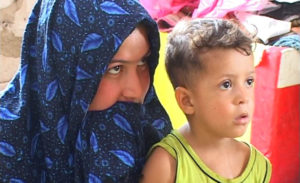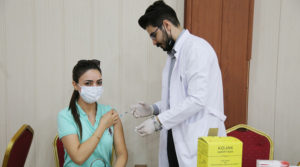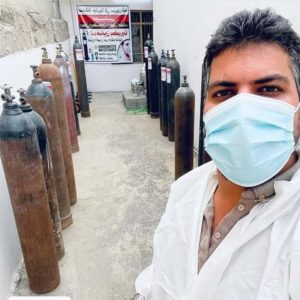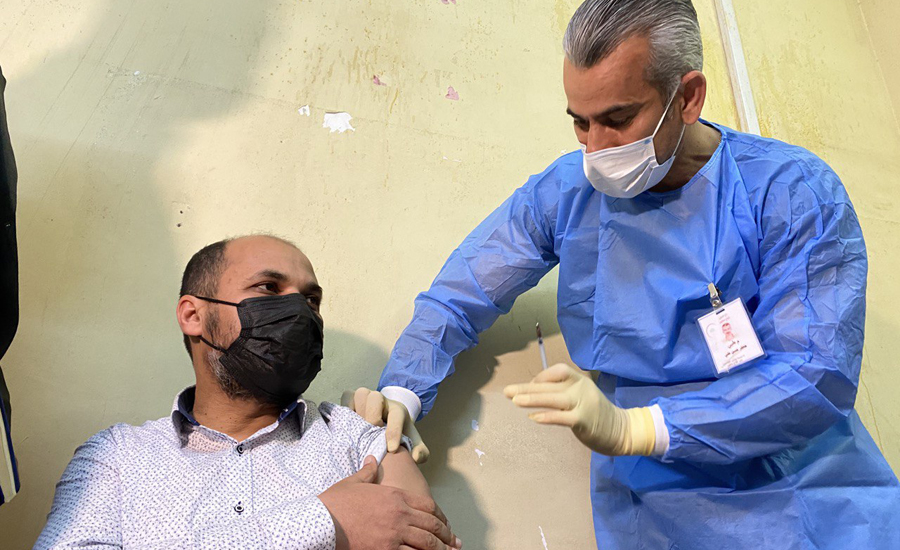
The administration of Khanaqin district, north of Diyala province, on the border with Iran, decided to provide fair access to Coronavirus vaccination to all people, the local residents and of the district and the internally displaced persons (IDPs) in order to encourage the displaced and provide them with facilities, which made them feel reassured that they enjoy the same rights to benefit from public health services.
According to the statistics of the Department of Migration and Displacement in Khanaqin, 8,000 are still residing in the centre of the province, suburbs and its villages after the Iraqi government decided last year to close the IDP camps across Iraq except for the Kurdistan Region of Iraq (KRI).
Helmet Muhammad, 19, a displaced person from Baghdad, lives in one of the villages in Khanaqin district. “I contracted the Coronavirus last year and almost died of the disease. I stayed in bed at home for 20 days and received treatment, so I decided to take the vaccine once recovered.”
He received the second dose of the Pfizer vaccine two months ago. “I felt pain at first, but I recovered. I received the vaccine at a government vaccination centre, and they did not ask me for more than a civil status card. The vaccination centre was empty that day.”
They did not ask me for more than a civil status card.
Helmet Muhammad.
The General Directorate of Khanaqin Health has opened four vaccination outlets inside Khanaqin and the surrounding villages. These centres inoculate all, residents and IDPs of the district. Mobile vaccination teams have also been formed that visit villages and remote areas.
Khanaqin is located in the north of Diyala province. It is inhabited by a mixture of Kurds, Arabs and Turkmens, Shiite and Sunni Muslims, in addition to a minority of Kaka’is.
Jaafar Hussein, the supervisor of the Corona Vaccination Unit in Khanaqin Health Center, affirmed, “Since the start of the Corona vaccination campaign, there has been no discrimination in Khanaqin between the local residents of the district and the displaced persons for vaccination,” based on a decision from the General Directorate of Khanaqin Health.
Hussein says that this decision is for the purpose of providing facilities and urging the IDPs to receive the vaccine. As a result, there are no statistics available about vaccinated IDPs in Khanaqin.
Map showing the location of Khanaqin District in Diyala Province.
Dakhil Ibrahim, another IDP from the city of Baghdad, who lives in the village of Amin Bapir, was infected with his wife and children last summer with the Coronavirus and they had to stay at home quarantined for about a month, after their recovery they decided at the end of the same year to take the vaccine.
We are one of the first people who decided to receive the vaccine in the village, because we suffered a lot after being infected with Corona. We went to the Khanaqin Health Center – in the district centre – there we received help from the workers in the centre and were able to obtain the vaccine by only presenting ID card and phone number, no one asked whether we are locals or displaced or where we are from.
Dakhil Ibrahim.
Ibrahim, a health worker for the vaccination campaign committee against Corona, told KirkukNow, “We tour the areas where the displaced live daily and urge them to receive the vaccine, especially in the villages of Amir Bapir and Mekhas.”
For his part, Jaafar Hussein, the supervisor of the Corona Vaccination Unit in Khanaqin Health Center, stressed that they are doing their utmost to provide facilities for citizens to urge them to take the vaccine for their safety and the safety of their families.
We have mobile teams that work for the same purpose in villages and neighborhoods and give the vaccine to everyone, regardless of the province they belong to.
Jaafar Hussein.
The majority of the IDPs in Khanaqin are from the provinces of Baghdad, Salah al-Din, Nineveh and other areas of Diyala, were displaced from their areas during the period of the war against the Islamic State of Iraq and Syria ISIS and did not return to it, either because of the lack of proper public services in their areas or because of the repercussions of the war, including tribal and sectarian conflicts, according to IDPs who spoke to KirkukNow.
According to government decisions, citizens can obtain the Corona vaccine provided that they have an official document such as an Iraqi nationality certificate, civil status card or national card, or even the identity of the displaced person that proves that its holder is Iraqi.
The statistics of the Iraqi Ministry of Health indicate that 470,280 doses of vaccine were distributed throughout Diyala until March 22, 2022, out of the total population of the governorate of almost 1,8 million people, according to the estimates of the Iraqi Ministry of Planning in 2021.
Currently, between 10-15 people receive the Corona vaccine daily in Khanaqin Health Center – the largest vaccination centre in the district – at a time last year between 100-150 people used to receive the vaccine in a day, according to Hussein.
The reason for this is that many people have received the vaccine. The people who visit the centre at the present time are the ones who had doubts in the past but were convinced of the importance of taking the vaccine.
Jaafar Hussein.
Pfizer-BioNTech, AstraZeneca and Sinopharm are available in Iraq. The largest proportion of vaccinated people in Khanaqin received the Pfizer vaccine because of its abundance in the district.
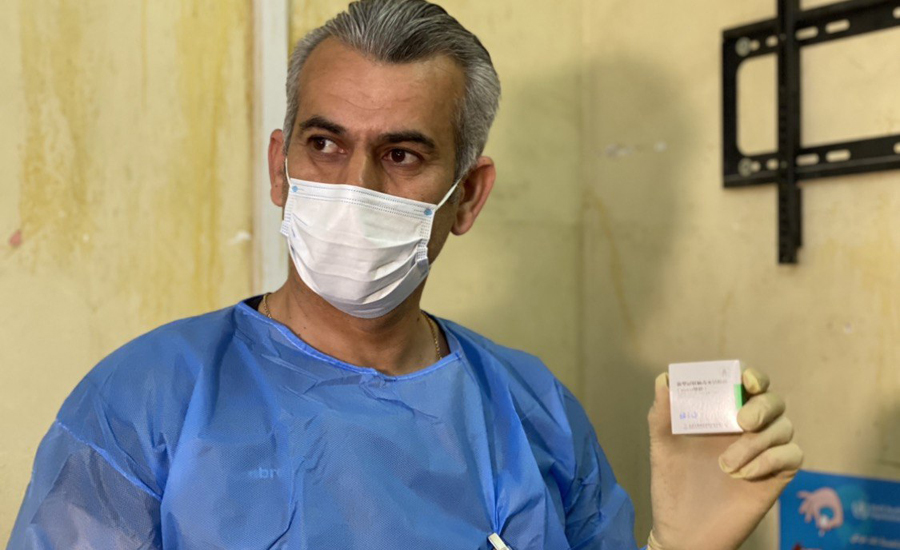
KirkukNow has called Sarmad Al-Bayati, Khanaqin Health Director in order to obtain statistics on the number of vaccinated people in Khanaqin but he did not respond.
According to the estimates of the Iraqi Ministry of Planning for 2019, the population of Khanaqin district is almost 240,000 people, more than 90,000 in the centre of Khanaqin district.
Mithaq Abdul-Mahdi, the representative of the displaced in the mayoralty of Khanaqin district, confirmed, “The displaced enjoy the same rights as the local community in Khanaqin to receive the vaccine…. Until now, no displaced person has complained about this.”
The Department of Migration and Displacement in Khanaqin did not require the IDPs to have a vaccination card in order to provide government assistance to them, as Mithaq Abdul-Mahdi stressed, but he said that they constantly encourage the IDPs through awareness posters in health centres and through mobile vaccination teams about the benefits of vaccination.
Concerning the turnout of the displaced to receive the vaccine, Abdul-Mahdi said, “At the beginning of the vaccination campaign, some were afraid of it and did not trust the vaccine, but at the present time most of them have received the vaccine.”
However, he did not have a statistic on the number of vaccinated displaced people because they were not separated registered by local health authorities.
We thank the health teams for visiting the areas where the displaced live and urge them to receive the vaccine.
Mithaq Abdul-Mahdi.
This article was originally published on KirkukNow. This article can be viewed in Arabic, Kurdish or Turkish via KirkukNow.

